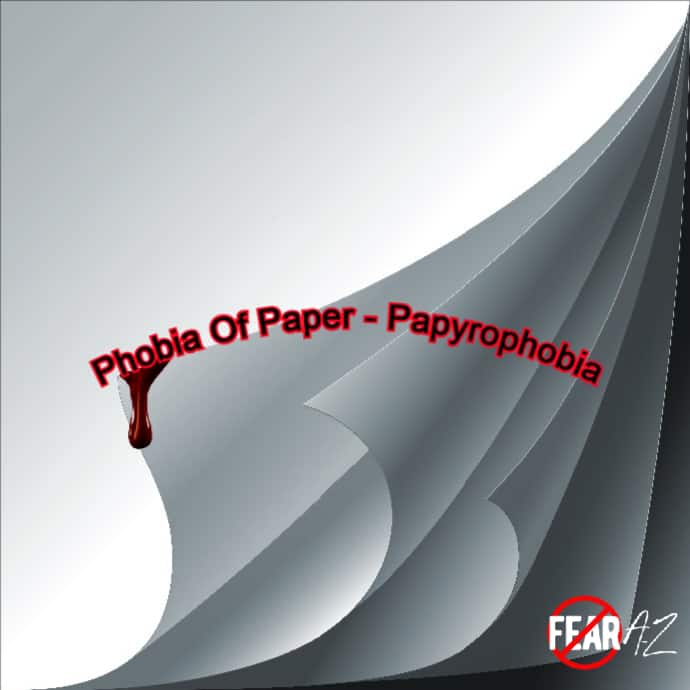Share This Article
Shredding Papyrophobia or the Fear of Paper
A rare phobia, yes, but papyrophobia is as real as any. And as a rare phobia, we don’t wish to overstate or understate the issues this excessive fear may cause those who suffer with it.
Do you fear writing on or even touching paper? Does the thought of getting a sheet of paper cause high anxiety? Are you terrified you may get a paper cut?
Does an encounter with paper leave you itchy, dizzy, and sweaty? Do you stay away from your workplace or any place that might house office supplies? Does the sound or sight of paper cause your heart to beat fast and make you want to flee? Is it shredded paper that causes your fear?
If yes, you are probably experiencing papyrophobia, a fear of paper. Only a very small number of people worldwide have a fear of paper, making it certainly an uncommon condition.
This phobia may sound like one found on an irrational fears list. Because of this, you probably fear being mocked and ridiculed. You may hesitate to discuss with anyone what you’re going through.
However, you can overcome papyrophobia with awareness and proper guidance. Although you can find successful treatment in self-help, you don’t have to battle the phobia alone. Talking to a family member or someone close to you is the first step in your battle against papyrophobia.

Papyrophobia Meaning
Papyrophobia is an illogical, excessive, and unjustified fear of paper. The term comes from the Greek or Egyptian words papyrus meaning paper and phobia meaning fear.
Papyrophobia Causes
Most rare specific phobias do not have a particular cause or reason—or at least one that you can pinpoint.
However, papyrophobia may have developed due to a childhood incident involving paper or a painful event when you could not complete a writing task. Or it may be due to some legal document or a piece of paper that relayed drastic news.
Papyrophobia may also have a genetic or hereditary cause, as many phobias run in families.
Seeing a loved one go through papyrophobia or hearing their vivid description of it may have also triggered the onset of the phobia.
Papyrophobia often has a direct connection to another phobia. For example:
- Mysophobia or germophobia (fear of germs)
- Cogombophobia (fear of cardboard boxes)
- Dendrophobia (fear of trees)
- Hemophobia (fear of blood, which a paper cut can cause)
- Chrometophobia (fear of money), especially paper money
Some Things You Need to Know about Papyrophobia
Papyrophobia is a specific phobia triggered by papers. However, as mentioned earlier, you may also suffer from other related phobias.
If you don’t need to deal with paper, you might live a relatively normal life without panic attacks and anxiety issues. However, this can be hard, as paper is a part of day-to-day life. With newspapers, currency notes, and bills, paper is a part of almost every person’s life and is unavoidable.
Those with mild phobia symptoms can go on with daily life with little anxiety. However, for someone who has a severe phobia, it can lead to complete social isolation.
Papyrophobia Symptoms
People with papyrophobia may realize their fear is irrational; however, that won’t stop them from experiencing physical and psychological symptoms.
Individuals with severe papyrophobia commonly experience panic attacks at school or work, because they fear if they approach paper, something terrible might happen to them.
Depending on the severity of the fear, papyrophobia symptoms vary from one individual to the next.
A clinician is likely to make a papyrophobia diagnosis if you experience some of these symptoms:
Physical Symptoms
- Trembling
- Increased heart rate
- Dizziness
- Vomiting
- Rapid breathing
- Diarrhea
- Dry mouth
- Nausea
- Sweating
- Stammering
Psychological Symptoms
- Feeling of dread
- Urge to run, scream, and cry
- Panic attack
- Fear of dying
The intensity of the symptoms experienced will determine the severity of the phobia.
Papyrophobia Treatment
Like most specific phobias, papyrophobia doesn’t have a particular treatment plan. But with proper counseling, therapy, and medication, papyrophobia is treatable.
During the early stages of the development of the fear, you can learn to manage the phobia with minimal efforts, self-help, and meditation. However, as the phobia advances, the person is increasingly imprisoned by their thoughts. In these cases, they will require professional therapy. Medication may also be prescribed to help deal with the physiological symptoms.
Self-Help
Self-help is the most easily accessible treatment for any phobia. Knowing that your fear is irrational and diverting the mind can help.
Recognizing your phobia of paper is the first step. Next, make changes in your lifestyle—healthy eating, exercise, and a regular sleep routine can help. You can also join support groups where you can voice your fear in a supportive environment.
Try relaxation techniques like deep breathing and counting numbers, and gradually expose yourself to paper to overcome the fear.
Professional Treatment
If self-help fails, you may feel frustrated and wonder how to cope with papyrophobia. But don’t dismay. Professional help can help you learn to manage your phobia of paper.
Cognitive Behavioral Therapy (CBT)
CBT is one of the most widely used therapies. It helps treat anxiety, panic attacks, depression, eating disorders, anger, and phobias.
It is a type of psychotherapy (talk therapy) that helps individuals identify the cause of their phobia and change their perceptions. According to CBT, your fear results from your thoughts and perception of the feared object.
The therapy targets your fear of paper and replaces the negative thoughts with more positive and realistic ones.
Exposure Therapy
Exposure therapy is another widely used form of therapy for phobias. It involves gradual exposure to paper in the presence of a professional health expert in a controlled environment. With regular exposure, you will realize that your fear of paper is irrational and that paper itself is essentially harmless.
Hypnotherapy
During hypnotherapy, trained professionals help you reach a subconscious, trance-like state to help you uncover the root cause of your phobia. Patients are often unable to pinpoint the cause and onset of their fear. Hypnotherapy helps them identify the cause and marks the first step in their recovery.
The hypnosis-induced subconscious mind is more open to suggestions. The therapist offers gentle guidance to effect changes in thought and behavioral patterns.
Dialectical Behavior Therapy (DBT) for Papyrophobia
Through DBT you will learn relaxation techniques and coping skills to help you manage papyrophobia. It is a talk therapy where you can freely express your fear. You will work with a professional to target the cause and learn skills to relax in extreme conditions of fear and anxiety.
Medications
Doctors may recommend anti-anxiety and antidepressant drugs in a few cases to calm patients experiencing severe panic attacks or anxiety and depression. They taper the usage of drugs when the patient starts showing noticeable results with therapy.
Learning to Cope with Papyrophobia
We all use paper. Most everyone comes into contact with it at least once a day. For a person with papyrophobia, avoiding paper can be next to impossible. This may cause them to lead an isolated and limited life.
If your attempt at self-help fails, a combination of therapy and medication may help you overcome your fear of paper.
In Conclusion
Your phobia of paper may grip you with anxiety and fear, affecting your daily life and forcing you into isolation. However, there is hope. With proper guidance and support, you can overcome papyrophobia.




